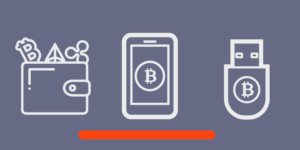Cryptocurrency wallets and storage
One of the most important decisions crypto investors need to make is what kind of wallet they’ll use to protect their digital assets.

The breakdown
- Choosing the right wallet is one of the most important steps in protecting your crypto.
- Wallet types range from convenient and easy to use ‘hot’ wallets, to more secure hardware options suitable for those with larger investments.
- Crypto wallets don’t actually store cryptocurrency — they store the information needed to access it.
Author: Kevin McHugh, Head of Publishing at Banked.
Safe storage and security continue to some of the major concerns around owning crypto. It’s been estimated that as much as 20% of all Bitcoin has been effectively lost due to owners losing the ability to access the details needed to get to their digital money.
Each type of wallet has its pros and cons, and we’ll explore all of them in this guide.
Interested in investing in cryptocurrency from New Zealand but aren’t sure where to start? Find out how to buy crypto in our guide.
See our comparison guide if you’re looking for the best crypto exchange for your needs.
What is a crypto wallet?

A crypto wallet keeps safe the information you need to access your cryptocurrency, such as Bitcoin, Ethereum, and so on. As crypto is a digital currency, crypto wallets are also digital.
Crypto wallets can be physical objects, such as a hardware wallet or a paper wallet, or it could be a software program that is installed on your phone or computer.
How does a crypto wallet work?
To understand how a crypto wallet works, you first need to understand that cryptocurrency is stored on a distributed ledger that exists on many different computers across a network at the same time. This ledger is called a blockchain.
A crypto wallet does not actually store your cryptocurrency, it stores the information needed to access an address on the blockchain. This information includes two very important numbers: your public key and your private key.
Public and private keys explained
Your public and private keys are the information that lets you access your cryptocurrency and receive payments.
Your public key works similar to your bank account number. You can share it with others so they can transfer funds to you, but they cannot access the currency in your account. Because it is so safe to openly share a cryptocurrencies’ public key, it’s common for businesses to publish it on their website or social media channel.
They vary in length, but here is an example of what a public key can look like: 03A83B9F053AFF42ECD075209700D5A3C340C7E2044514BCD89398BE93FC1BF4A5
The public key can be compressed, or ‘hashed’, down to form your cryptocurrencies address on the blockchain.
A private key is the information needed to access your cryptocurrency so it is very important that you keep it protected. If your public key is like your bank account number, your private key is like your PIN number. You should never share your private key with anyone else or store it in a place that is accessible to others.
A private key looks something like this: L26KZ2Ja525eUN5dEo4zKrcd4DZCU2ST8UzY1nTi2i58M3WZxbD3
Hosted wallets
Hosted wallets, also known as hot wallets, are a type of online wallet that is connected to the internet in some way. Hosted wallets exist on the platform of a cryptocurrency company and are typically offered by crypto exchanges used to initially purchase cryptocurrency.
These wallets are popular because they are similar to an online banking experience many of us are used to. Once you’ve logged in, you can see your balance, carry out transactions, and buy more crypto.
However, exchanges are frequent targets of hackers and there is a risk that your crypto could be stolen in a cyber-attack. Exchanges have increased their security in recent years and successful cyber-attacks are less common than they used to be, but it is still certainly a risk to consider.
Example hosted wallets include: Freewallet and Coinbase.
Pros and cons of a hosted wallet
Pros
- Easy and intuitive to use.
- Carry out transactions on the go.
- Free to use
Cons
- While the security of exchanges has improved, they can and will still suffer cyber-attacks.
- The exchange is the ‘custodian’ of your coins and access to them can happen only on that particular exchange.
Software wallets
Software wallets are basically apps that can be stored on your mobile device or computer.
As with most modern apps, they are typically very simple to use and they provide access to your crypto wherever you have your device.
With a software wallet, you also have the option to do a backup which provides protection if you lose or damage your device. When you do a backup you will be provided with a 12-word code that you use to recover your wallet on another device if you can’t access the original.
However, it’s important that this code is kept separate from the device itself — for example, it’s a bad idea to have a screenshot of the code on the same device the software wallet is installed on.
The main flaw with a software wallet is that, like pretty much all software, it’s susceptible to attack and bad computing practices. If you accidentally install malware or your device access details fall into the wrong hands, you could lose your crypto.
Examples of software crypto wallets include: Exodus, Jaxx and Electrum.
Pros and cons of a software wallet
Pros
- Easy to use and convenient.
- Backup provides protection against loss or damage to the device.
- Free to download and use.
Cons
- Your crypto may be at risk if the security of your device is compromised.
Hardware crypto wallets
A hardware wallet is a physical USB device designed specifically for the purpose of storing cryptocurrency. They are practically immune to malware and are considered to be the most secure way of protecting your crypto and they are certainly something you should consider if you have a substantial amount of crypto.
As opposed to online ‘hot’ wallets, hardware wallets are ‘cold’ in that they are not accessible to the internet. This means that they cannot be hacked remotely.
Information regarding a crypto transaction you want to make is passed to and from the hardware wallet by connecting it to your computer via a cable. A program installed on your computer limits what information can be transferred and your private key never leaves the wallet.
If your hardware wallet is stolen, your crypto will remain safe unless the thief also has your PIN. Hardware wallets can also be backed up in a similar way to software wallets.
Examples of hardware wallets include: the Ledger Nano S and Nano X, the Trezor One and Trezor Model T.
Pros and cons of a hardware wallet
Pros
- The most secure way to store your cryptocurrency.
- Can be backed up.
- Include a feature that wipes the device after a number of failed PIN entries.
Cons
- Not as convenient as online wallets
- Can be pricey. The Ledger Nano starts at around $150 New Zealand dollars.
Paper crypto wallets
The most basic of all crypto wallets is the paper wallet. A paper wallet is simply your public key and/or your wallet address and your private key printed on a piece of paper.
There are a number of websites that can be used to generate paper wallets. Here is an example of what a bitcoin paper wallet looks like:
These types of cold wallets were once considered to be one of the most secure ways to protect your crypto, but they have since fallen from popularity due to a number of flaws.
Paper wallets have the obvious advantage of being entirely resistant to the attempts of hackers. However, the practicalities of protecting a single piece of paper long term are challenging.
Firstly, there is no option to backup a paper wallet. If you lose the wallet and the information printed on it, you have lost your cryptocurrency.
You could choose to create two or more copies and store them in different locations, but then you are multiplying the risk. Saving the wallet as a document or other kind of digital file on a computer, but would make it even more susceptible to theft or loss than an online wallet.
Pros and cons of a paper wallet
Pros
- As a cold wallet, it is protected from the attacks of hackers, malware and similar.
- Aside from the cost to print the wallet (in a secure way), the paper wallets are free.
Cons
- Suitable storage of a paper wallet might be the most challenging of all wallet options.
- Backing up is not an option, and duplicating the wallet adds risk.
What type of crypto wallet is best?
A hardware wallet is accepted as the most secure way to store cryptocurrency. They are not accessible to the internet, the private key leaves the wallet, and it can be backed up and restored if it’s lost, damaged or stolen. Hardware wallets are not foolproof and owners still have to protect their PIN and backup phrase, but they are the wallet of choice for serious investors.
However, if you only have a small amount of cryptocurrency, a hardware wallet may not be a sensible investment. You would have to be very optimistic about the future value of your $100 worth of crypto to spend $150 dollars on a hardware wallet, for example.
If you only have a small amount of crypto, you might be better off considering a software wallet. While they are not considered as secure the hardware alternative, they are convenient, easy to use, and free.



